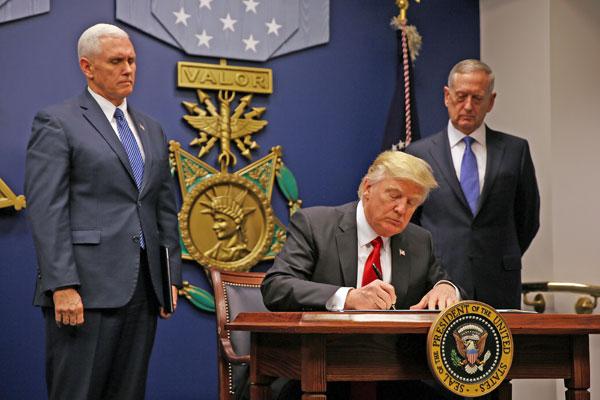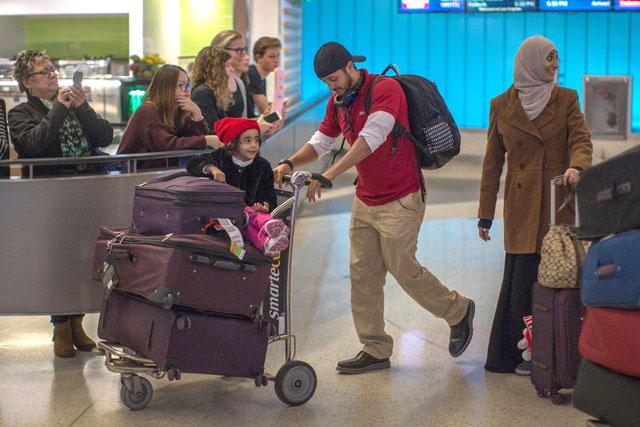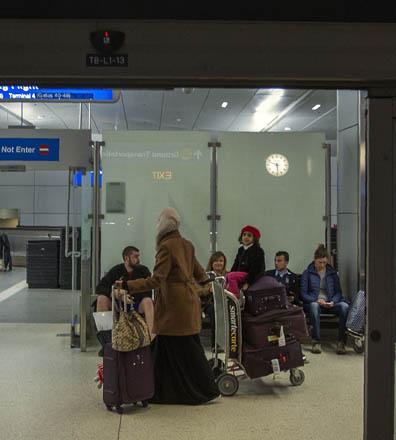You are here
Trump’s new travel ban raises bar for legal challenges
By Reuters - Mar 07,2017 - Last updated at Mar 07,2017

President Donald Trump signs an executive order for a US travel ban, at the Pentagon in Washington, US, January 27 (Reuters photo)
NEW YORK/SAN FRANCISCO — The new, more narrowly tailored temporary travel ban President Donald Trump signed on Monday will be more difficult to challenge successfully in court, legal experts said.
They said that since his order no longer covers legal residents or existing visa holders, and makes waivers possible for some business, diplomatic and other travellers, challengers are likely to have a harder time finding people in the United States who can legally claim they have been harmed, and thus have so-called “standing” to sue.
Trump’s first executive order signed on January 27 banned travellers from seven Muslim-majority nations — Iran, Iraq, Libya, Somalia, Sudan, Syria and Yemen — for 90 days and halted refugee admission for four months, barring Syrian refugees indefinitely. Its hasty implementation caused chaos and protests at airports. The order was hit with more than two dozen lawsuits, many that claimed it discriminated against Muslims.
The new ban, which goes into effect on March 16, removes Iraq and adds categories of people who would be exempt from the order. The Trump administration said the executive order is necessary for national security reasons.
It also lists groups of people that could be eligible for waivers, including travelers who have previously been admitted to the United States for work or school, those seeking to visit or live with a close relative and who would face hardship if denied entry; infants, young children and adoptees or people in need of medical care, employees of the US government and international organisations among others.
All the exceptions make the new order “a lot harder to attack”, said Andrew Greenfield, an immigration attorney with Fragomen law firm in Washington DC.
Trump had promised to make the new directive harder to fight in court and many of the changes were expected.
“They dotted their ‘i’s’ and crossed their ‘t’s’ in trying to anticipate what litigation might result,” said Stephen Yale-Loehr, a Cornell Law School professor who specialises in immigration. He said opponents might still be able to find plaintiffs — a US citizen could potentially sue if the government denies a waiver to their foreign spouse for an arbitrary reason, for example.
‘Do our homework’
In a legal challenge to the original order, the state of Washington was successful in preventing it from being carried out. A federal judge in Seattle and then an appeals court in San Francisco ruled that Washington could claim standing, in part because the order adversely affected legal permanent residents, known as green card holders, in the state. More than 100 businesses, including many of the best-known tech companies, filed briefs in court that argued their employees were harmed.
Bob Ferguson, the attorney general for Washington State said on Monday that he will likely decide on the next litigation steps this week after consulting with state universities and businesses about potential harms.
“We need to do our homework and be thoughtful about this,” Ferguson said.
The US Department of Justice, in a filing in Seattle federal court on Monday, said the new order applies “only to those who are overseas and without a visa.”
Foreign nationals outside the country who do not have a US visa do not have the same protections under the US Constitution as people already here, legal experts said.
Rosemary Jenks, the director of Government Relations at NumbersUSA, a conservative group that favours less immigration overall, said that the new order would leave the state of Washington having to argue on behalf of unidentified foreign nationals who have not been screened, vetted or processed yet by US authorities.
“That would be a pretty big stretch,” Jenks said. And unlike the old order, the new one lays out with more detail why the specific countries were selected, she said.
Attorneys challenging the ban, including the American Civil Liberties Union said there were still questions about whether or not the ban is justified by national security reasons, and the revisions do not address concerns that the order discriminates based on religion.
Adam Lauridsen, a Keker & Van Nest attorney in San Francisco representing students challenging Trump’s first order, noted the revised directive still targets Muslim-majority countries.
Stephen Legomsky, chief counsel at US Citizenship and Immigration Services in the previous Obama administration, pointed to statements by Trump about wanting a Muslim ban.
“That evidence is baked in, you can’t change the past,” said Legomsky. He said, however, that does not mean the inevitable legal challenges will ultimately be successful in the likelihood that they reach the US Supreme Court. “It’s not a slam dunk.”
Related Articles
PALM BEACH, Florida/WASHINGTON — US President Donald Trump is considering issuing a new executive order banning citizens of certain countrie
WASHINGTON — US President Donald Trump on Tuesday criticized a federal appeals court one day after it handed him another legal setback by re
WASHINGTON — US President Donald Trump on Monday signed a revised ban on travellers from six Muslim-majority nations, scaling back the order
















